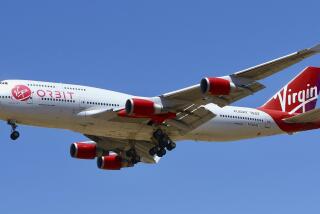Philip Bono, Reusable Rocket Booster’s Designer, Dies at 72
- Share via
COSTA MESA — A man who gained recognition in the mid-1960s for originating the design of reusable booster rockets died of heart failure Sunday at the age of 72.
Philip Bono, a resident of Costa Mesa, is credited in biographies in Who’s Who in America and Who’s Who in the World for inventing the first version of a recoverable single-stage spacecraft booster.
The rocket, which was never actually manufactured but was patented by NASA, was designed to send a spacecraft into orbit and have it return intact with its booster instead of having the boosters drop away after launch.
“His designs were about 30 years ahead of their time,” said Bono’s daughter Kathryn Hickmann. “People weren’t prepared for the progressiveness of his ideas, but he tried very hard all of his life to see his dreams come to fruition.”
Wayne Campbell, a McDonnell Douglas engineer who worked with Bono for many years, said the company is just now preparing to produce a prototype similar to the single-stage spacecraft booster Bono envisioned.
“They are just getting ready to try it, and I know Phil would be very happy because this was one of his passions,” said Campbell, 60.
Bono was born in Brooklyn, N.Y., in 1921 and graduated from USC in 1947 with a degree in mechanical engineering. He also served for three years in the U.S. Naval Reserve.
Bono went to work for what was then known as Douglas Aircraft Co. in 1960 and then to McDonnell Douglas Astronautics Co. in Huntington Beach in 1966 where he stayed until 1988.
He was co-author of the book “Frontiers of Space,” published in 1969, and contributed articles to several national and international science journals.
Bono is survived by his wife of 43 years, Camille; son, Richard, and daughter, Patricia, all of Costa Mesa; and daughter, Kathryn Hickmann of Livermore, Calif.
More to Read
Sign up for Essential California
The most important California stories and recommendations in your inbox every morning.
You may occasionally receive promotional content from the Los Angeles Times.













